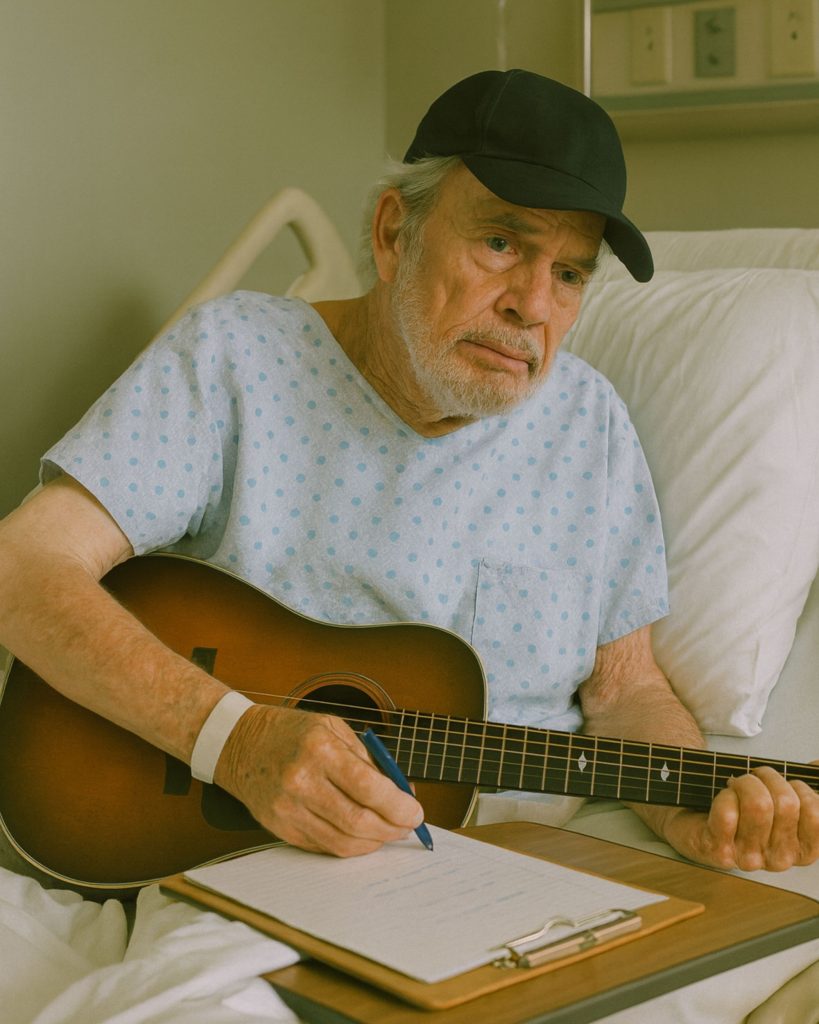
There are few images more searing than a great singer refusing to stop. In his final months, as pneumonia shrank the world around him and doctors urged rest, Merle Haggard crossed the short distance from hospital bed to home studio and recorded what many are calling his final testament — a spare, aching song called Kern River Blues that reads like a last letter set to guitar.
Haggard’s voice is not the rough-hewn roar of his youth. It is thinner, weathered, and somehow more exact. The song doesn’t chase radio success. It sits like a conversation — an older man looking back at the road that made him and the river that keeps going. For listeners who grew up with him, the cut is a sharp reminder: this was a songwriter who refused to romanticize the past. He named the place that shaped him, he named the leaving, and he let the music hold the rest.
Close friends and collaborators say the sessions were urgent and intimate. They were not the grand, polished productions of career retrospectives. Instead, they were quick, honest captures — a few takes, a breath, then another line to keep the story moving.
“He wanted people to remember him as a man who told the truth. He picked up that guitar knowing his time was short and he put everything into each note,”
said Teresa Haggard, his wife and longtime supporter, who watched the last months with a close, steady gaze. Her presence in the studio, by many accounts, was quiet but essential: a steadying hand and a reminder of who he was beyond the stage.
Music historians note how the tone of these last recordings shifts from nostalgia toward reckoning. Where earlier hits might have polished memory into myth, Kern River Blues stands as a ledger of choices, losses, and the forward motion of things that cannot be stopped.
“This isn’t a farewell wrapped in melodrama. It’s a reckoning — clear-eyed, plainspoken. Merle was giving us his answer to a life that was messy, beautiful and honest,”
said Bill Malone, country music historian, who has written extensively about the Bakersfield sound that helped define Haggard’s art.
For older fans, the song lands like a quiet jolt. Bakersfield — the scene and the town that shaped his style — is invoked not with rose-tinted memory but as a place that carved a voice out of hard years. The arrangement is lean. The words land like stones in a river: they sink, they shift, they carry you along.
Behind the music are small scenes that feel cinematic: friends begging him to rest; nurses and family urging him to pause; a stubborn man lifting his guitar anyway. Those who were there describe late-night sessions where he’d sing lines he’d written in hospital rooms, turning illness into artistry rather than defeat.
That determination deepens the track’s power. It makes listening less about mourning and more about witnessing a craftsman at work in the face of limits. It explains why a man with an impressive catalog of hits would still return, in his last days, to the studio. He wasn’t merely revisiting memory. He was finishing sentences.
The recordings raise hard questions for fans and the music community alike: How do we honor creation made under strain? When is persistence heroic, and when is it refusal? The answers feel intimate and personal — different for each listener — but the music itself offers one clear truth: Haggard’s voice wanted to be heard, even if his body was failing.
In the final takes, the familiar themes reappear — travel, loss, the river as witness — but there is a new edge: acceptance without surrender. The sound is unfinished in places. That is part of its honesty. It suggests a life that kept moving until the last possible moment, and a man who chose to leave music behind as his signpost—